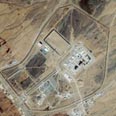Iran is expanding its covert global search for the uranium it needs for its nuclear activities and a key focus is Zimbabwe, says a new intelligence report acquired Tuesday by The Associated Press.
The report is in line with international assessments that Iran's domestic supplies cannot sustain its nuclear program that could be turned toward making weapons.
An intelligence report from a member country of the International Atomic Energy Agency - shared with the AP by an official from that nation - says Iranian Foreign Minister Ali Akbar Salehi met secretly last month with senior Zimbabwean mining officials "to resume negotiations ... for the benefit of Iran's uranium procurement plan."
"This follows work carried out by Iranian engineers to map out uranium deposits in Africa and assess the amount of uranium they contain," said the two-page intelligence summary.
The report - confirmed independently by an official from another IAEA country - was shared as an Iranian delegation led by the head of the Cooperative Ministry Abbas Johari was meeting Thursday with "agriculture and mining interests" in the Zimbabwean capital Harare.
'Iran's reserves limited, of poor quality'
The official confirming the intelligence described the Salehi visit as part of an international Iranian effort that stretches across Africa, Asia and South America and may involve more than a dozen countries. Both officials - whose countries closely follow Iran's nuclear program - asked for anonymity in exchange for discussing intelligence matters.
"Iran's known uranium ore reserves are limited and mostly of poor quality making them commercially unprofitable to mine," says former United States Deputy Assistant Secretary for Nonproliferation Mark Fitzpatrick.
With the completion date of any Iranian nuclear reactor network decades away, Tehran may have other pressing reasons to look for replenishable ore supplies, said Fitzpatrick, now head of nonproliferation for the London-based International Institute for Strategic Studies.
Iran, he said, now has enough uranium gas to make 20 or 30 nuclear weapons, should it choose to turn what it says is a peaceful program into making such arms. If that supply were destroyed by a military attack or sabotage, "that could put a serious crimp into Iran's ability to reconstitute the program."
"That's why for strategic reasons it's not surprising that Iran is continuing to try to acquire additional sources," he added.
- Follow Ynetnews on Facebook
















